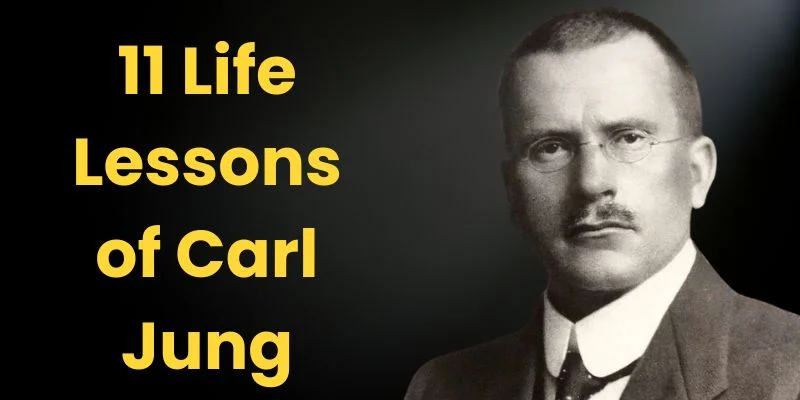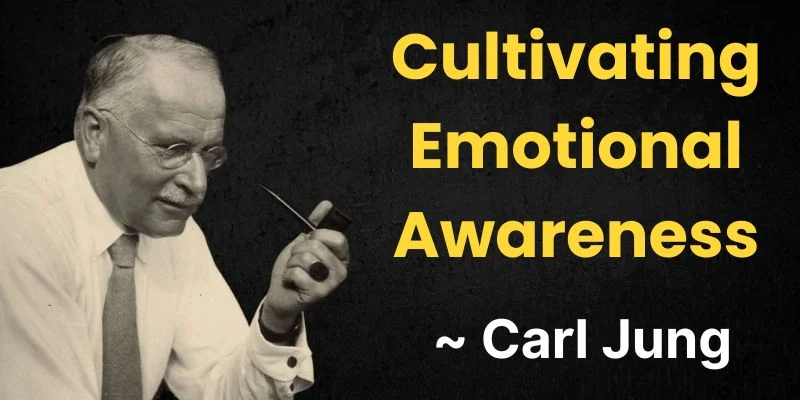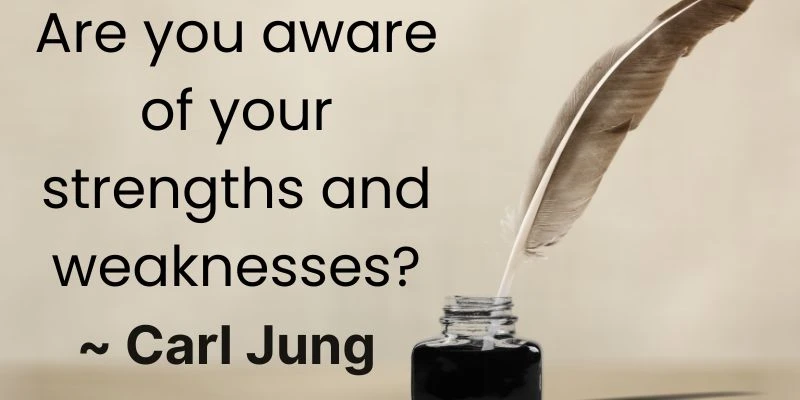11 Key Lessons From Carl Jung to understand Your Inner Strength
Published: 23 Apr 2024
Carl Jung was a Swiss psychiatrist, psychoanalyst, and founder of analytical psychology.
As we go through life, we all wonder who we are and why we’re here. This journey to understand ourselves isn’t easy, but it can make us question our beliefs and help us have a happy life.
But according to Carl Jung, a famous expert in mind and psychology, asking these questions makes our lives more meaningful.
His thoughts about understanding yourself are still helping and motivating people of this generation.

Carl Jung Life Lessons
Here are Five inspirational life lessons from Carl Jung that people often learn too late in life. So, try to learn the philosophy of Carl Jung with his life-changing lessons.
Carl Jung’s teachings offer profound insights into the journey of self-discovery and personal growth, reminding men that true fulfillment comes from embracing their vulnerabilities, cultivating emotional awareness, and honoring the complexity of the human Psyche.
Embracing Vulnerability.
Life’s Lesson: Jung emphasized the importance of embracing one’s vulnerabilities and shadows. Men often conditioned to suppress emotions and maintain a facade of strength, may learn later in life that true courage lies in acknowledging and accepting their vulnerabilities.
By embracing their whole selves, including the aspects they may have deemed as weaknesses, men can cultivate deeper connections with others and foster inner peace.
Navigating the Complexities of Masculinity
Explanation: Carl Jung challenged the traditional notions of masculinity, advocating for a more holistic understanding that incorporates both strength and sensitivity.
People may learn later in life that true masculinity does not rely solely on external displays of power or dominance but also encompasses qualities such as empathy, compassion, and emotional intelligence.
By embracing a more nuanced view of masculinity, men can break free from societal expectations and forge healthier, more authentic identities.
Cultivating Emotional Awareness

Carl Jung Thought: Carl Jung emphasizes the importance of self-awareness and introspection in navigating the depth of the Psyche.
People realize the significance of cultivating emotional awareness and understanding their inner workings.
By exploring their emotions and unconscious patterns, men can develop a deeper understanding of themselves and their relationships, leading to greater fulfillment and authenticity.
Honoring The Feminine Within
Explanation by Carl Jung: Carl Jung expressed the feminine energies within each individual, regardless of Gender.
People may learn the importance of honoring and embracing their feminine qualities, such as intuition, nurturing, and creativity later in life.
By learning these aspects of themselves, men can cultivate a more balanced and harmonious inner landscape, leading to greater personal growth and wholeness.
Embracing the Journey of Individuation
Thinking of Carl Jung on Personal Development: Carl Jung proposed the concept of individuation, the process of integration of all aspects of the self to achieve personal wholeness and fulfillment.
We should learn the fact that True fulfillment comes not from external achievements or social validation but from the journey of Self-Discovery and inner Transformation.
By learning the journey of individuation, people can unlock their true potential and live more meaningful and authentic lives.
Jungian Philosophy about Spending a Happy Life
Learn the philosophy of Carl Jung on how to lead a happier life. We will discuss the Two Important Principles of Jungian Philosophy on self-discovery.
If someone asked you How to be Happy in Life? Share these short Philosophical principles of Carl Jung.
Idea of Balance in Life
Carl Jung championed the principle of balancing in life, he emphasized the need to balance our conscious and unconscious thoughts. For Jung, this did not mean suppressing our unconscious thoughts but rather acknowledging and integrating them into our conscious self. This process, which he termed ‘INDIVIDUATION’, is crucial in our journey toward happiness.
Jung also stressed dealing with our ‘SHADOW’, a term he used to refer to the unconscious aspects of our personality that we might prefer to ignore. However, by confronting and integrating our shadow, we become more whole and therefore, more likely to experience Genuine Happiness.
Concept of Wholeness
According to Carl Jung’s Philosophy, Happiness is not found in perfection, but in becoming whole.
The Pursuit of perfection, he argued can lead to a narrow focus and exclusion of important aspects of our self. In contrast, pursuing wholeness allows us to embrace all parts of ourselves, including our flaws and imperfections.
“So, according to Jung, happiness isn’t something to chase after, but rather something that comes naturally as we grow and evolve as Individuals.”
Jung’s philosophy about Happiness concludes that Happiness is not a destination but rather a by-product of personal growth and self-realization. Life’s balance plays a pivotal role, and confronting our shadow, and integrating our unconscious mind paves the way to joy.
“ Happiness is not about a constant state of Euphoria but about a journey to self-understanding and Growth.”
4 Essential Steps Towards Self-Awareness by Carl Jung
According to Jung, our true potential is not something we acquire; rather it’s something that has always been within us.
How can we unlock our hidden potential with Jungian philosophy?
Jung emphasized the importance of self-awareness by talking about understanding our passions, giving up our addictions, being honest about our abilities, and making our weaknesses our strengths.
Who defines You?
Is it the people around you or your own self? This is a very important question that we must all ask ourselves.
In the realm of Jungian Philosophy, Carl Jung emphasized the journey to self-realization, a path that requires the courage to look within and define oneself through one’s own lens.
It’s easy to let the external world shape our self-perception. The opinions of others, societal norms, and expectations can easily seep into our self-image. But does this reflect who we truly are?
The answer is ‘NO’. We must resist the temptation to fit into molds created by others and instead carve out our own identity courageously.
Remember< Self-definition is an ongoing process of self-awareness that requires Honesty and courage.
Do you have the courage to confront your Addictions?
Jung always asks this question to every individual who seeks to unlock his true potential.
Many forms of addiction stop or bind us from becoming who we truly want to be. Jungian philosophy emphasizes the importance of facing our ‘SHADOW’, the darker, and less understood aspects of our personality.
This shadow often harbors our addictions, whether they be to substance or habits. Confronting these addictions is not a battle to be won in a single day, It’s a continuous journey of self-discovery and self-improvement.
Overcoming these addictions helps us to explore our passions to define ourselves, space for us to grow, and to realize our true potential.
Are you aware of your strengths and weaknesses?

This is a fundamental step towards self-awareness and personal growth. Jung emphasizes the importance of honesty about our capabilities. We all have strengths or unique qualities that make us who we are.
But we also have weaknesses or aspects of ourselves that we might shy away from or even deny. In Jagian Philosophy, these hidden or denied parts are known as our ‘SHADOW’
The Key to Personal Development is facing our shadow (weaknesses) rather than running from it. We can transfer our weaknesses into strengths by acknowledging and integrating them.
When was the last time you took a deep dive into your mind?
This question is the beginning of a profound journey of Self-Reflection.
Carl Jung deeply emphasized his teachings to look deeply into our minds after some time.
This rule of Carl Jung is about making time for deep reflection, a dedicated exploration of your inner self, thoughts, feelings, fears, and aspirations.
Jung strongly believes in the power of inner dialogue. He considers it a vital tool to understand oneself better, to confront our shadows, and to eventually integrate them into our consciousness.
Conclusion
The lessons we listed here are just a small portion of Jung’s endless teachings. I hope they help you uncover hidden life lessons and empower you to understand yourself better.
What’s your favorite Carl Jung Life Lesson? Please share your precious opinion with us in the comments below!

- Be Respectful
- Stay Relevant
- Stay Positive
- True Feedback
- Encourage Discussion
- Avoid Spamming
- No Fake News
- Don't Copy-Paste
- No Personal Attacks

- Be Respectful
- Stay Relevant
- Stay Positive
- True Feedback
- Encourage Discussion
- Avoid Spamming
- No Fake News
- Don't Copy-Paste
- No Personal Attacks





